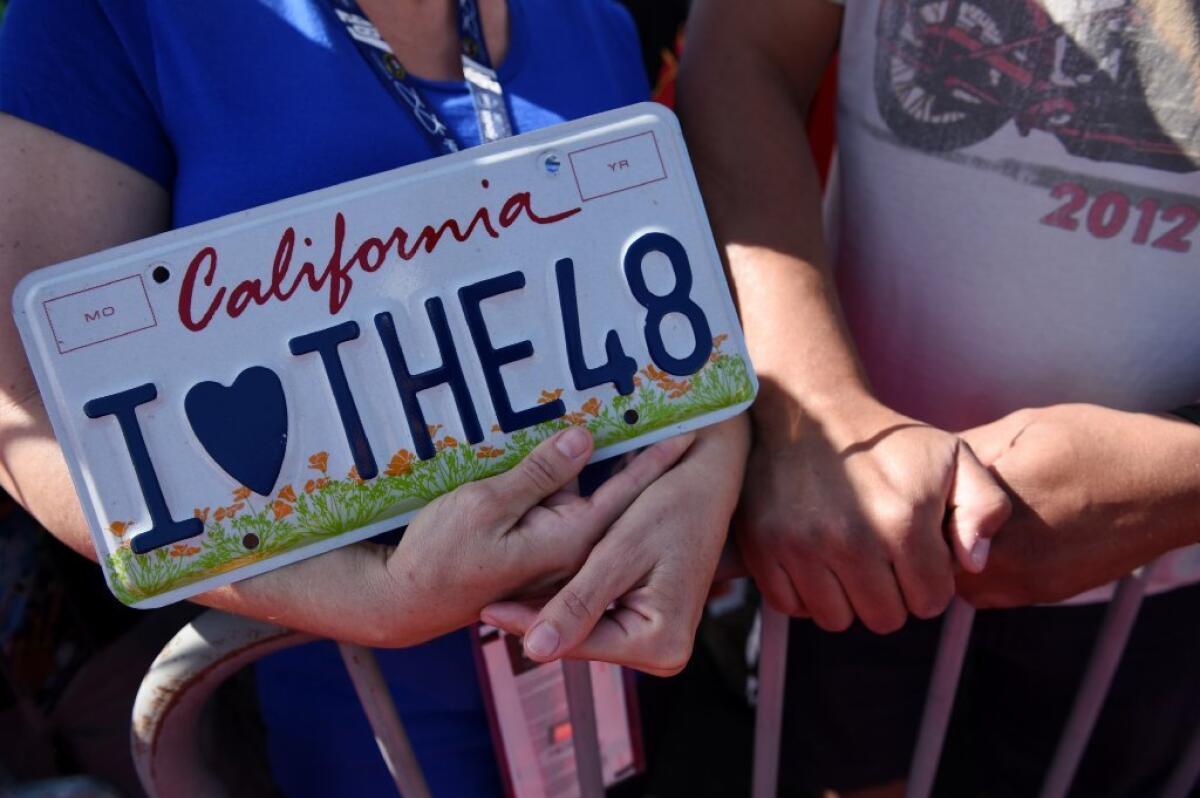Opinion: Yes, you do have a right to a Confederate flag vanity license plate

- Share via
Specialty license plates are often silly and distracting, but they usually don’t raise constitutional issues. An exception is a plate the state of Texas refused to issue because it featured the Confederate battle flag. This week, a federal appeals court ruled — rightly, I think — that the refusal violated the 1st Amendment. But that needn’t be the end of the story.
Under Texas law, any nonprofit organization can request the issuance of a specialty plate, but the Department of Motor Vehicles can reject designs that “might be offensive to any member of the public.” The DMV exercised that power when it declined to issue a plate requested by the Sons of Confederate Veterans.
It’s easy to see why the proposed plate was controversial. It would have displayed the Confederate battle flag framed on all four sides by the words “Sons of Confederate Veterans 1896.” Even 15 or 20 years ago, that flag was widely (if not universally) viewed as a symbol of the Confederate dead. Today, it’s equally widely seen as an emblem of racism.
The problem is the pesky 1st Amendment, which, as the Supreme Court reaffirmed only three years ago, prevents the government from prohibiting the expression of an idea “simply because society finds the idea itself offensive or disagreeable.”
The question for the court was who would have been “speaking” through the Confederate license plate: the state or the driver? Texas pressed the first theory, arguing that the 1st Amendment doesn’t give anyone a right to “commandeer the machinery of government to support their desired message.”
But the U.S. 5th Circuit Court of Appeals, taking into account the state’s willingness to put all sorts of messages on license plates, said it was confident that “a reasonable observer would know that a specialty license plate is the speech of the individual driving the car.”
The decision also cited the only famous Supreme Court decision about free speech and license plates, the 1977 case of Wooley vs. Maynard, better known as the “Live Free or Die” case. In that ruling, the court held that a New Hampshire couple were wrongly punished for taping over the Granite State’s famously feisty motto on their plate because it conflicted with their beliefs as Jehovah’s Witnesses.
Notwithstanding the appeals court’s conclusion that a reasonable person wouldn’t associate the state of Texas with the Confederate license plate’s “message,” some people in Texas obviously do make that connection and are thereby offended. Are they out of luck if the court’s decision isn’t reversed?
Not necessarily. Suppose Texas banned all specialty and personalized license plates, be they humorous (like Kramer’s on “Seinfeld”), inspirational or commemorative. The only thing that would appear on the plate would be the name “Texas” and a random collection of letters and numbers. (Decorative frames for the plates would also be forbidden.)
I don’t think a blanket ban on specialty license plates would violate the 1st Amendment, and it would have advantages beyond preventing what some people see as state endorsement of an offensive message. As I have argued before, specialty license plates are distracting for police and witnesses to an accident or crime. (It’s harder to remember a number when your eyes are taking in the Confederate flag or a tableau from nature.)
No-frills plates would solve the distraction problem and moot the 1st Amendment issue as well. If a driver wanted to proclaim where he went to college or demonstrate his support for wildlife conservation, he could do it on a bumper sticker.
Follow Michael McGough on Twitter @MichaelMcGough3
More to Read
A cure for the common opinion
Get thought-provoking perspectives with our weekly newsletter.
You may occasionally receive promotional content from the Los Angeles Times.










